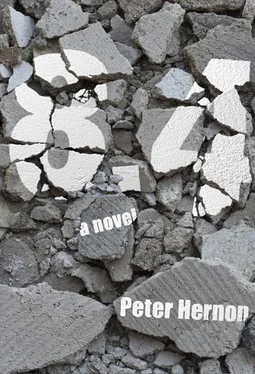The trooper shouted, “Do you hear that?”
The ground thirty feet from Atkins opened with a tearing sound and just as quickly slammed shut again. It cracked and groaned like an ice floe breaking up. The grinding noise was loud, unnerving. The fissure was four or five feet across and could have been several hundred yards long.
There was another good shake, less intense than the first. This one shattered the diner’s hand-painted plate-glass window. Customers began pouring out of the place.
Atkins ran to help the old man, who was still lying on the front porch of the parsonage. The house had been pushed off its stone foundation and was listing on its side. The crevasse left a jagged crack in the ground that crossed the road at a right angle, splitting the pavement in a wide gash. The offset was a good two feet.
Atkins got the man under one arm, while the trooper took the other. The man’s wife had come out to help. Both of them were dazed with fear. The woman said he was a Baptist minister. They both kept staring at the cemetery, eyes clouded, uncomprehending. The ground was littered with fragments of broken caskets, pooled muddy water, and bones.
It took nearly an hour of trying before Atkins finally managed to get through to Walt Jacobs’ office at the University of Memphis. He made the call from the diner.
Jacobs, who’d arrived back in Memphis late the night before, gave him the news. The earthquake was a magnitude 7.1, the biggest quake on the New Madrid Fault in 104 years. The epicenter was about thirty miles northeast of Reelfoot Lake, but the seismic energy had radiated due south. Memphis had taken a solid hit.
“We’ve got some damage here,” Jacobs said, struggling to regulate his voice. “The reports are just starting to come in. Sounds a lot like Northridge. We’re going to have some casualties.”
KENTUCKY LAKE
JANUARY 10
6:22 A.M.
MOST MORNINGS STARTED EARLY FOR LAUREN Mitchell, well before six, and this one was no exception. Even though they’d had an ice storm the night before, the white bass were running in the main channel and there were some die-hard fishermen who put on insulated snowmobile suits and went out after them in bass boats. It didn’t matter how cold or wet it was. Someone was always out on the water.
Lauren was getting ready to check the fingerlings in the minnow tank when the first sharp jolt knocked her to the floor. Her feet came right out from under her and she went down hard, barely getting her hands up in time to break the fall.
Another hard shake was followed closely by two more, each more powerful than the other. The dock lurched up and down, straining the mooring cables until they creaked and vibrated. Fishing rods, reels, and other gear crashed down from their pegs and shelves. Lauren waited until the wild seesaw motion slowed before she went outside on the deck.
In a matter of seconds, the lake had changed dramatically. The water churned with whitecaps. Lauren hardly recognized it. She’d never seen the normally placid water so rough, not even during the recent spells when big waves were running. It was boiling out there.
Lauren had to grip the railing hard when the dock began rocking again. Water washed over the walkways. For a moment she wondered if the marina was going to pull apart or collapse. That was the first she realized what was happening: they were having an earthquake. And, by the feel of it, a damn good one.
Thank God her grandson, Bobby, had already left for school in Mayfield, she thought. The boy liked to hang out on the dock in all kinds of weather. If he’d been on one of the narrow walkways that separated the boat slips, he might have lost his balance and gone into the water.
It would have been a good time for that geologist to be here. When this was over, maybe she’d give him a call in Memphis. If they were looking for reasons why all those animals were going crazy, they had their answer now. She remembered the frozen frogs and snakes. Somehow they’d known what was coming.
She wished suddenly that her husband Bob were still alive. Maybe he could have made some sense of all this.
God, how she missed the man. She’d never gotten over his death.
Lauren had bought the boat dock nearly twenty years earlier using insurance money she’d received after her husband and fourteen other men were killed in a coal mine accident. They were working in the Golden Orient, the deepest, most deadly mine in Kentucky. A cave-in on level 15 had trapped Bob and the others fifteen hundred feet underground. It took six weeks to get the bodies out. They found all of them in a twenty-foot-long section of tunnel. The air had probably given out in about an hour. Everyone, her husband included, had suffocated, but not before many of them had scribbled notes to their wives and loved ones on scraps of paper and stuffed them in their pockets. She kept Bob’s note framed on her dresser. There were only seven words: I LOVE YOU GOD KEEP YOU SAFE.
A year after Bob’s death, Lauren bought the dock and marina. She and her grandson lived on a two-hundred-acre farm about two miles away. They had a stable and three horses. It was a good life. The dock was making a little money. Lauren couldn’t complain. Her parents had recently moved to Heath, near Paducah. She was living on their farm. Her dad had decided to move into the city when it got too hard to climb up on a tractor. Her mother hadn’t minded at all. She’d jumped at the chance to leave the country.
The dock was still bumping up and down in the rough water. Lauren got a pair of binoculars and focused on the big dam that loomed two miles in the distance. It stretched nearly a mile and a half across the north end of the lake. Kentucky Route 41, a two-lane blacktop, ran right along the top of it.
Lauren couldn’t believe what she was seeing. Huge waves were slamming up over the rim of the dam. It looked as though the water was washing right over the highway. She’d never seen anything like that before.
SANTA MONICA
JANUARY 10
8:49 A.M.
ELIZABETH HOLLERAN HAD GOTTEN UP MUCH later than usual. She slipped into a pair of khaki chinos and a denim shirt and went into the kitchen to make a pot of coffee. She normally drank decaf, but not this morning. Groggy with fatigue, she needed a jolt of the real thing. She’d crawled into bed shortly after 3:00 a.m., then had awakened twice, unable to sleep, too agitated by Otto Prable’s video and the data she’d seen at his office.
Holleran was trained to be extremely skeptical about any purported earthquake prediction. It was an inbred, almost instinctive defense mechanism. There were too many well-meaning incompetents. Too many psychics. Too many wild-eyed quacks ready to come out of the woodwork and forecast a big quake. She’d come by her skepticism naturally. Her father was a retired biologist who’d taught at Northwestern for nearly thirty years. What she knew about the rigors of the scientific method and self-discipline she owed to him. He’d trained her to rely solely on her own observations and verifiable facts; nothing else mattered. Nothing.
Holleran wanted to go over Prable’s data again and examine it carefully with all the critical skepticism she could muster. She wanted to do her best to find the holes that would quickly disprove it. There was bound to be a miscalculation or false assumption on his part, but it might take her days of hard work to ferret it out and she didn’t have any time to spare.
She needed to call Jim Dietz. She’d meant to do that yesterday, but had completely forgotten once she started looking at Prable’s data. Their plan had been to work the trench at Point Arguello for another two or three days, depending on the weather.
Holleran turned on the radio and got out some breakfast dishes. By then it was past 8:00. Time for the news. She caught something about a strong quake with damage and injuries near Memphis. Holleran dropped her cereal dish in her haste to turn up the volume. Milk and cornflakes splashed onto the tile floor.
Читать дальше












